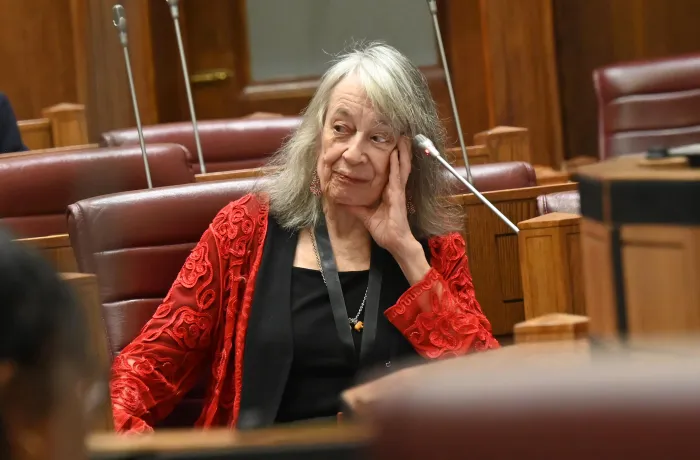De Haas refuses to name sources, threatens to end testimony at police inquiry

Ethics versus oversight: Dr De Haas defends source confidentiality before Parliamentary committee
Image: Ayanda Ndamane/Independent Newspapers
Violence Monitor Professor Mary De Haas stood her ground before Parliament’s Ad Hoc Committee, refusing to disclose the names of her confidential sources, warning that she might withdraw her testimony unless her ethical boundaries were respected.
Appearing before the Committee investigating police infiltration by a sophisticated criminal syndicate known as the “big five,” which had infiltrated the police, De Haas explained how she became one of the central figures in the hearings after she called for the Political Killings Task Team (PKTT) to be disbanded.
Her testimony comes in the wake of explosive allegations levelled against her by KwaZulu-Natal Commissioner Lieutenant General Nhlanhla Mkhwanazi, who accused De Haas of being privy to sensitive internal police information and “very vocal” in pushing to dissolve the PKTT and questioned her objectivity.
The PKTT was disbanded by the now-suspended police Minister, Senzo Mchunu, whom Mkhwanazi accused of protecting high-profile criminals, an allegation Mchunu refuted.
During Tuesday’s testimony, De Haas vehemently challenged many aspects of the police’s approach, painting a picture of pervasive abuse, corruption, and a lack of transparency within the PKTT and related agencies, but refused to provide evidence or identify her sources.
She drew criticism for refusing to name individuals who provided her with sensitive information about the task team’s alleged wrongdoing.
“It is my pleasure that you have taken this initiative, but I cannot give names,” De Haas said firmly.
“What I’m saying here is that it’s not just in this case - it was one policeman I must protect - the other cases involve different people who spoke to me independently.
“I live in a very violent province. I can hardly move myself now because I could get killed, so I have to take every step to protect people.”
When asked if she would be willing to provide names in a closed, in-camera setting, De Haas declined, insisting that trained investigators and police officials were better placed to handle such sensitive disclosures.
Committee Chair Lesetja Lekganyane pressed for guidance on how to treat evidence from unnamed sources, warning that, without corroboration, such evidence might be disregarded.
“If you say you have evidence based on a source but refuse to name the source, how is the committee to proceed? Are you saying the evidence must fall away because it is unsubstantiated?” the chair asked.
De Haas held firm on her refusal, a stance that drew sharp rebukes from several MPs.
ANC MP Xola Nqola suggested in-camera testimony as a compromise, while MK party MP David Skhosana expressed frustration, urging De Haas to cooperate for the sake of truth.
“We want to know the truth. We are not the Madlanga Commission; we are a parliamentary committee seeking to complement investigations. If you refuse to give names, we must decide the way forward,” said Skhosana.
MK party’s Sibonelo Nomvalo accused De Haas of undermining Parliament’s authority.
“This is Parliament, not a place to undermine oversight. You cannot pick and choose what you reveal. If you have names you won’t give, then you shouldn’t speak of sources.”
Conversely, DA MP Glennys Breytenbach sympathised with De Haas’s academic ethics.
“Protecting sources is fundamental to her work. Naming sources publicly would destroy her ability to continue with her work.”
EFF MP Leigh-Ann Mathys and others suggested confidentiality protocols could be developed to protect informants while allowing the committee to access vital information.
PA MP Ashley Sauls took strong exception to De Haas’s suggestion that she might stop testifying, emphasising Parliament’s constitutional powers to compel witnesses.
“It feels like she’s talking down to us. We are a legitimate constitutional body. If you refuse to cooperate, we can compel you.”
Evidence leader Norman Arendse conveyed sympathy for De Haas’s academic constraints but noted the committee’s need for substantiated evidence, proposing closed sessions to consider sensitive material.
However, De Haas reaffirmed her ethical stance, stating, “I am still a religious social worker. Betraying someone’s confidence would end my professional integrity.”
“Most of what I’ve presented is already on record. Only one policeman’s name is withheld for his safety. I’ve reported these matters to Parliament, to the police, and to committees before.
“I am pleased Parliament is finally addressing these issues. The Madlanga Commission has investigators trained for this. I am just the messenger,” said De Haas.
As hearings continue over the next few weeks, the committee’s ongoing inquiry remains a critical effort to restore public confidence in South Africa’s justice system and address allegations that threaten the integrity of law enforcement.
thabo.makwakwa@inl.co.za
IOL Politics
Get your news on the go. Download the latest IOL App for Android and IOS now
Related Topics: